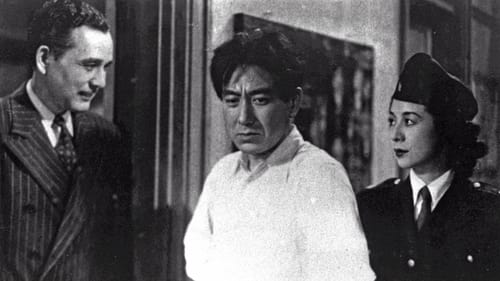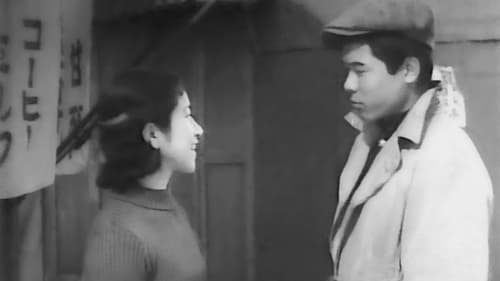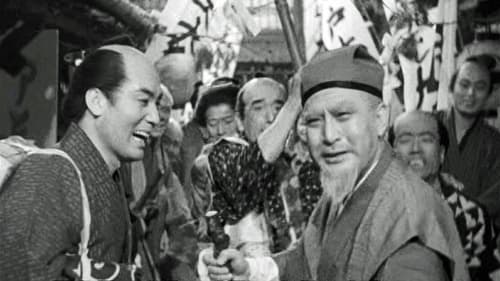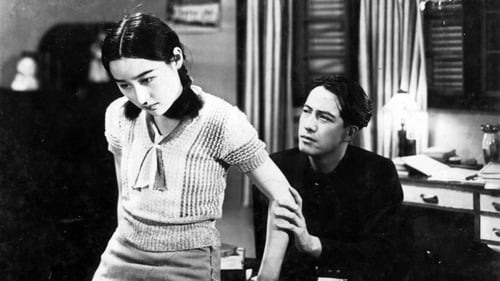Den Obinata
出生 : 1907-03-15, Kitakyushu, Fukuoka Prefecture, Japan
死亡 : 1980-08-21

Shûsuke Tokuyama
映画『窓から飛び出せ』は、二組の家族の交流を描いた心温まる作品です。徳山周介(大日方傳)は農業と畜産業を営み、父の理太郎(汐見洋)、弟の勇二(小林桂樹)、妻の藤子(轟夕起子)、4人の子供(うち3人が大日方の息子と娘2人)の8人という大家族で暮らしていました。隣家の藤枝家は、船長だった夫を海での遭難事故で亡くした千栄子(岡村文子)と娘の茉利子(香川京子)、足に障がいがありリハビリを続ける息子の道夫(大日方の息子)の3人家族でした。その徳山家と藤枝家の交流を通して、家族の大切さ、人の優しさが画面いっぱいに映し出されます。

Original Story
映画『窓から飛び出せ』は、二組の家族の交流を描いた心温まる作品です。徳山周介(大日方傳)は農業と畜産業を営み、父の理太郎(汐見洋)、弟の勇二(小林桂樹)、妻の藤子(轟夕起子)、4人の子供(うち3人が大日方の息子と娘2人)の8人という大家族で暮らしていました。隣家の藤枝家は、船長だった夫を海での遭難事故で亡くした千栄子(岡村文子)と娘の茉利子(香川京子)、足に障がいがありリハビリを続ける息子の道夫(大日方の息子)の3人家族でした。その徳山家と藤枝家の交流を通して、家族の大切さ、人の優しさが画面いっぱいに映し出されます。

Inspector Okada
When a young woman is named as the prime suspect in a murder, her girlfriend and her girlfriend's boyfriend set out to prove her innocence. Their investigation leads them to an isolated, creepy house in the middle of nowhere, where sinister goings-on abound.

The investigative unit of the Metropolitan Police Department organized a special investigative team to uncover a series of frequent gang robberies and car gangs...
This is the first film in the Nippon G-Men series, of which four more films were later released.

Ryunosuke Miyata
A young man rents an apartment in Tokyo and discover it was built by his father. He falls in love with the daughter of the mistress of the house and decides to marry her. Only to discover that his father is is in debt and wants him to marry Ranko so that she may help his company by granting 1.5 million yen. Teruko decides to borrow money from a greedy bar owner who lends her money on certain conditions and photographs her without her consent. A love traingle forms between Koroku, Ranko, and Teruko. Things complicate when Koroku marries Teruko and Tsugawa threatens them for the money causing many twists and turns.

Editor (as Den Obinata)
A newly hired daily newspaper writer covering the society beat receives an assignment to cover Tokyo at night by walking and observing it. He gets into the right frame of mind by dressing the part as a vagrant with not a penny to his name. He gets into trouble ending up at the police station slammer overnight. He has no material to write about and, with his assignment unfulfilled, faces a cross editor.

Igarashi, chief

Susunu (as Den Obinata)
What is marriage? Young couple in match-making wanted to know before they decide. They visited married couples of sisters and brothers. Love comedy in 1942.

Instructor of training camp

This movie is presumed to be lost.

The film was produced during Second Sino-Japanese War, before the Pearl Harbor Attack in 1941. The film mainly concerns the training of newly-recruited pilots and their daily life, then their subsequent fighting experiences in China. Army supported the production, providing all the authentic airplanes, training and actual actions. They even provided the older biplanes disguised as Chinese fighter planes. Obinata plays the trainer-turned-combat-leader, who is passionate and cool at the same time. All his boys love him, of course. The film is not as intense, full of sugar-coated camaraderie, until young pilots are killed in action one by one. Last twenty minutes are fairly grim, as the message of self-sacrifice is heard loud and clear.

Twenty-year-old Yoshiko (Setsuko Hara) and her younger sister Asako (Yōko Yaguchi) struggle to accept changes in their home during the preparations of their widowed father's wedding to his chosen bride, Maki Tsuneko (Sadako Sawamura), who's anxious about her conduct as the bride.

Part two of two.

Part one of two.

LTJD Mine (as Den Obinata)
This film attempts to reconstruct the tension of the Battle of Shanghai through an episode in an understated way, introducting its story in a documentary mode. In the film story, Japan's marine regiment protects Japanese residents and Chinese refugees-women and young children-from rampant street fighting, Shanhai Rikusentai unsparingly uses its first eight minutes for an official-mannered self-justification of the war. From the viewpoint of explaining Japan's military operation,the narration refers to the city s spatial division in sync with maps on screen.

Ogawa - the teacher
The Whole Family Works, Mikio Naruse's adaptation of a Sunao Tokunaga novel, feels more of a piece with the writer/director's quietly observant and psychologically charged later work. For the Naruse-familiar, it is an anomaly only in its placement within his filmography—indeed, this could be a film made by the elder, stasis-minded Naruse momentarily inhabiting, through a metaphysical twist of fate, his stylistically exuberant younger self. Set in depression-era Japan around the time of the Sino-Japanese War (which the director evokes, during a brief dream sequence, by dissolving between children's war games and actual adult warfare), The Whole Family Works gently observes a family coming apart at the seams. Ishimura (Musei Tokugawa) is the jobless father of nine children.

Venice Film Festival 1939

あらすじ
市川右太衛門が水戸黄門を演じた『水戸黄門漫遊記 地獄谷の豪族』、『水戸黄門漫遊記 伏魔殿の妖賊』の2作品をまとめた総集篇。農民に身をやつし、助さん格さんを連れて諸国行脚をする水戸黄門は、信州の地獄谷にたどり着く。ここには野武士の残党が山に住み着き良民を苦しめていた。幕閣の実力者・柳澤は仁礼家の家系図を狙い、野武士を使って仁礼家の当主・友之助の家を襲わせる。丁度、黄門一行がいて撃退するが、黄門一行が役人に捕縛される。

Teacher Masaki
Based on an original story by Yojiro Ishizaka, this well-made drama is set in a Christian school in a beautiful northern harbor town. Teacher Masaki (Obinata) speaks up for Keiko, one of the girls at the school, every time she causes problems because he feels sorry for her, a child born out of wedlock. Sumi (Natsukawa), one of Masaki’s colleagues and who is secretly in love with him, strongly disagrees with him about Keiko. Then Sumi hears a rumor that Keiko is pregnant with Masaki's child . . . .

Joji Yamazaki
A Japanese comedy from the end of the silent era (it has music) from a popular series. A feud, a practical joke and romance are the set up for some great comedy and drama from a team of distinctive appearance who are exploiting their silent cinema styles to the full.

Living Things a film by Heinosuke Gosho

Keitaro
Keitaro is a law student and Yaeko s a high school girl. They are neighbors, and their friendship is starting to develop into something more romantic. Then, Yaeko's sister Kyouko has a breakup with her husband and returns home. Kyouko is clearly interested in Keitaro and Yae becomes anxious.

Chounan, Sadao
The film tells of the strained relationship between a mother and her two sons after the death of the family patriarch.

Jiro
坂本武演じる喜八を主人公とした「喜八シリーズ」の第一弾。長屋で息子の富夫と二人で暮らす喜八は、日雇い労働者として工場に勤めている。同僚で隣に住む次郎と一緒に演芸場へ出かけた喜八親子は、その帰り道で春江という女性と出会う。彼女は工場をクビになり、行く当てがないという。喜八は、行きつけの食堂の店主である“かあやん”に、春江を泊めてほしいと頼み込んだ。春江は食堂に住み込みで働かせてもらうことになった。富夫は年甲斐もなく春江に熱を上げるが、彼女は次郎に興味を持っていた。

Kenji
Kenji and Chuko travel to Hokkaido as migrant workers and enlist as miners under the strict leadership of Guzuyasu. On the boat journey to Hokkaido, Kenji attracts Ohama, who is travelling to Hokkaido to open a bar. When Kenji visits the bar, he chases away a sailor who was hassling a shy girl, Ofuji, which makes Ohama jealous.

Mizuhara, a student
"The Dancing Girl of Izu" tells of the story between a young male student who is touring the Izu Peninsula and a family of traveling dancers he meets there, including their youngest girl. The student finds the naïve girl attractive even though he eventually has to part with the family after spending memorable time together.

An early Japanese sound film, notable for being the only Japanese film ever to use the Western Electric Sound System. Contrary to most Western sources that give sole directing credit to Eizo Tanaka, it was actually co-directed by six different directors, Tanaka, Kazue Kimura, Kazuo Takimura, Ryoji Mikami and Hidekuni Ouchi.



















